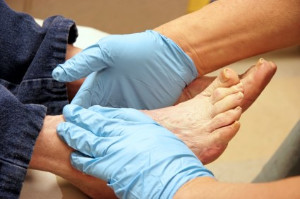Items filtered by date: February 2017
What is Morton’s Neuroma?
 Morton’s neuroma, caused by a thickening of tissue around the nerves in your toes, usually happens between the third and fourth toes, causing a feeling like something is stuck in your sock. Your foot, which has more than 100 muscles, 26 bones, and 33 joints, is a very complex structure, which is why foot pain can be so common. Morton’s neuroma is often treated fairly simply, by things like foot and arch supports, anti-inflammatories, orthotics, and physical therapy. It is always important to discuss with your doctor the treatment plan that is right for you. This condition must be treated to ensure that no additional foot complications develop over time.
Morton’s neuroma, caused by a thickening of tissue around the nerves in your toes, usually happens between the third and fourth toes, causing a feeling like something is stuck in your sock. Your foot, which has more than 100 muscles, 26 bones, and 33 joints, is a very complex structure, which is why foot pain can be so common. Morton’s neuroma is often treated fairly simply, by things like foot and arch supports, anti-inflammatories, orthotics, and physical therapy. It is always important to discuss with your doctor the treatment plan that is right for you. This condition must be treated to ensure that no additional foot complications develop over time.
Morton’s neuroma is a very uncomfortable condition to live with. If you think you have Morton’s neuroma, contact Dr. Mark Gagnon of Advanced Podiatry. Our doctor will attend to all of your foot care needs and answer any of your related questions.
Morton’s Neuroma
Morton's neuroma is a painful foot condition that commonly affects the areas between the second and third or third and fourth toe, although other areas of the foot are also susceptible. Morton’s neuroma is caused by an inflamed nerve in the foot that is being squeezed and aggravated by surrounding bones.
What Increases the Chances of Having Morton’s Neuroma?
- Ill-fitting high heels or shoes that add pressure to the toe or foot
- Jogging, running or any sport that involves constant impact to the foot
- Flat feet, bunions, and any other foot deformities
Morton’s neuroma is a very treatable condition. Orthotics and shoe inserts can often be used to alleviate the pain on the forefront of the feet. In more severe cases, corticosteroids can also be prescribed. In order to figure out the best treatment for your neuroma, it’s recommended to seek the care of a podiatrist who can diagnose your condition and provide different treatment options.
If you have any questions, please feel free to contact one of our offices located in Crestwood, Orland Park, and Summit, IL . We offer the newest diagnostic and treatment technologies for all your foot care needs.
How Not to Get Plantar Warts
 Plantar warts are growths on the feet caused by a virus. The virus can be contracted in moist, warm environments like gym locker rooms or around an indoor pool. If you have cuts on your feet take extra special care to avoid any contact with these surfaces. Make sure to change your socks everyday and never share them with others. Plantar warts are typically not painful at first, but as they grow they can hurt when you walk. If you notice the wart while it is small, there are various types of home remedies that may be effective. However, once the plantar wart grows larger, a podiatrist will be your best option.
Plantar warts are growths on the feet caused by a virus. The virus can be contracted in moist, warm environments like gym locker rooms or around an indoor pool. If you have cuts on your feet take extra special care to avoid any contact with these surfaces. Make sure to change your socks everyday and never share them with others. Plantar warts are typically not painful at first, but as they grow they can hurt when you walk. If you notice the wart while it is small, there are various types of home remedies that may be effective. However, once the plantar wart grows larger, a podiatrist will be your best option.
Plantar warts can be very uncomfortable. If you need your feet checked, contact Dr. Mark Gagnon from Advanced Podiatry. Our doctor will assist you with all of your foot and ankle needs.
About Plantar Warts
Plantar warts are the result of HPV, or human papillomavirus, getting into open wounds on the feet. They are mostly found on the heels or balls of the feet.
While plantar warts are generally harmless, those experiencing excessive pain or those suffering from diabetes or a compromised immune system require immediate medical care. Plantar warts are easily diagnosed, usually through scraping off a bit of rough skin or by getting a biopsy.
Symptoms
- Lesions on the bottom of your feet, usually rough and grainy
- Hard or thick callused spots
- Wart seeds, which are small clotted blood vessels that look like little black spots
- Pain, discomfort, or tenderness of your feet when walking or standing
Treatment
- Freezing
- Electric tool removal
- Laser Treatment
- Topical Creams (prescription only)
- Over-the-counter medications
To help prevent developing plantar warts, avoid walking barefoot over abrasive surfaces that can cause cuts or wounds for HPV to get into. Avoiding direct contact with other warts, as well as not picking or rubbing existing warts, can help prevent the further spread of plantar warts. However, if you think you have developed plantar warts, speak to your podiatrist. He or she can diagnose the warts on your feet and recommend the appropriate treatment options.
If you have any questions please feel free to contact one of our offices located in Crestwood, Orland Park, and Summit, IL . We offer the newest diagnostic and treatment technologies for all your foot and ankle needs.
The Importance of Diabetic Foot Care
 For those who have diabetes, it’s important to remember how vital it is to take proper care of your feet. Diabetes can lead to long-term foot problems if the feet are not constantly monitored and managed. Avoid using temperature-controlled items such as heating pads or electric blankets, as diabetic feet are prone to a loss of feeling, or neuropathy and can be easily burned. Avoid picking at corns, calluses, or ingrown toenails without professional supervision. Always wear shoes and avoid walking barefoot. Do routine checks of your feet, maintain proper hygiene, and do foot exercises to encourage blood circulation. Be sure to watch your diet to maintain healthy blood sugar levels, and visit your podiatrist often for check-ups.
For those who have diabetes, it’s important to remember how vital it is to take proper care of your feet. Diabetes can lead to long-term foot problems if the feet are not constantly monitored and managed. Avoid using temperature-controlled items such as heating pads or electric blankets, as diabetic feet are prone to a loss of feeling, or neuropathy and can be easily burned. Avoid picking at corns, calluses, or ingrown toenails without professional supervision. Always wear shoes and avoid walking barefoot. Do routine checks of your feet, maintain proper hygiene, and do foot exercises to encourage blood circulation. Be sure to watch your diet to maintain healthy blood sugar levels, and visit your podiatrist often for check-ups.
Diabetic foot care is important in preventing foot ailments such as ulcers. If you are suffering from diabetes or have any other concerns about your feet, contact Dr. Mark Gagnon from Advanced Podiatry. Our doctor can provide the care you need to keep you pain-free and on your feet.
Diabetic Foot Care
Diabetes affects millions of people every year. The condition can damage blood vessels in many parts of the body, especially the feet. Because of this, taking care of your feet is essential if you have diabetes, and having a podiatrist help monitor your foot health is highly recommended.
The Importance of Caring for Your Feet
- Routinely inspect your feet for bruises or sores.
- Wear socks that fit your feet comfortably.
- Wear comfortable shoes that provide adequate support.
Patients with diabetes should have their doctor monitor their blood levels, as blood sugar levels play such a huge role in diabetic care. Monitoring these levels on a regular basis is highly advised.
It is always best to inform your healthcare professional of any concerns you may have regarding your feet, especially for diabetic patients. Early treatment and routine foot examinations are keys to maintaining proper health, especially because severe complications can arise if proper treatment is not applied.
If you have any questions please feel free to contact one of our offices located in Crestwood, Orland Park, and Summit, IL . We offer the newest diagnostic and treatment technologies for all your foot and ankle needs.
